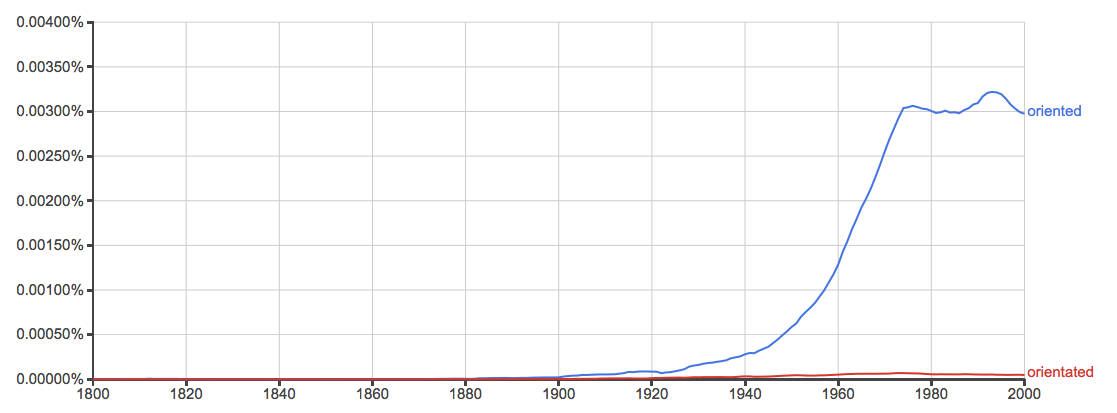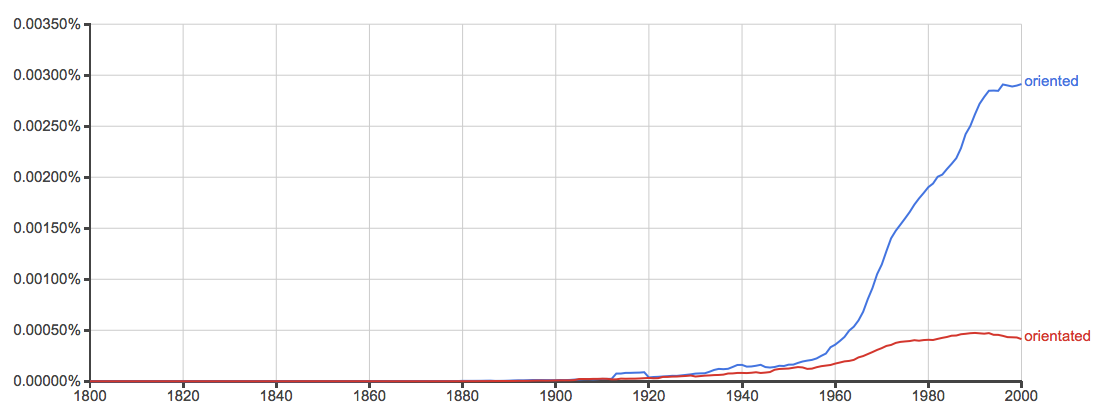The words oriented and orientated can cause a bit of confusion and unease for an author because not many writers are sure what differentiates the two. Are they just variants of the same word? Do they have different meanings or uses in a sentence?
In today’s post, I want to address these questions, so that you will never again second-guess yourself while writing either of these words.
So, what is the difference between oriented vs. orientated?
What is the Difference Between Oriented and Orientated?
 Oriented and orientated are both verbs and mean to align or position; to know one’s bearings; to make familiar with a new situation.
Oriented and orientated are both verbs and mean to align or position; to know one’s bearings; to make familiar with a new situation.
- Can you hold up a minute? I’m still trying to get oriented.
- After climbing the mountain, he orientated his telescope to the North Star.
- We are having a new student seminar to help freshman get oriented to campus life.
- It takes considerable time for an immigrant to get orientated with American life.
You’re probably still wondering, “Okay, when do I know which one to use?”
The answer to that question is that there is no demonstrable difference in use or function between the two, and they can be used completely interchangeably.
That said, one option is widely shunned, and there is a clear choice that you should pick in your writing.
When to Use Oriented
What does oriented mean? Although there is no real difference in meaning or function between the two words, there is clearly a better choice, and that is oriented.
Oriented is a more straightforward, clear word form, and Garner’s Modern American Usage calls orientated a needless variant.
If you look at the graph below, you can see just how little orientated is used in American English.

This is reason enough to avoid orientated in your writing, for the simple fact that its use will cause your readers to perk their ears and question your word choice, distracting them from the actual content of your work.
In British English, orientated is much more common than it is in American English, but it still falls below the shorter, simpler oriented by a number of multiples.

While it might not be shunned to quite the same degree in British English, it’s still a good idea to avoid it.
When to Use Orientated
 What does orientated mean? As I mentioned above, there really isn’t a good reason to use orientated in your writing.
What does orientated mean? As I mentioned above, there really isn’t a good reason to use orientated in your writing.
People sometimes use the word orientated because they see and hear the word orientation and think that orientated is the verb made from it, but really it is just a needless variant.
It’s best to avoid it altogether.
Possible Distinctions
Some people say that there is a slight distinction between the two words, at least with regards to one specific meaning.
If you look at the specific meaning to face or turn east, it has been said that only orientated bears this meaning. In other words, orientated is used to refer to geographic directions while oriented is used in more metaphorical senses like getting one’s bearings straight.
This distinction certainly isn’t borne out by usage, both words are used for both meanings, even in Great Britain, and many dictionaries list orient as also having to do with directions. Fowler’s actually has a great little usage note on this topic,
“The shorter form [orient] emerged in the 18c. (first cited in Chambers Cyclopaedia of 1728) and the longer one [orientate], in the same sense (as in the French original), in the 19c. (1848), both with the meaning ‘to face or cause to face east’ specifically in relation to the east-west alignment of churches. Both words then went in identical directions and developed the same extended sense: ‘to place in any particular way with respect to the cardinal points of the compass’: and figuratively, ‘to ascertain one’s “bearings” ‘.”
It’s clear from this that even from the inception of these words they have had the same meanings, so I’m not fully convinced there is any distinction between the two–let alone one that is in widespread use and worth adhering to.
I still think the best advice for the writer moving forward is to opt for the shorter, easier oriented in all senses.
Remember the Difference
A good, general rule of thumb for writing is that simpler writing is better writing.
If you apply this rule when you are stuck on whether to choose oriented or orientated, you should be all set.
Think of orientated as being the longer, more complicated version of the word and oriented as being the shorter, simpler version of the word.
Summary
While there isn’t a functional difference between these words, there is clear winner in the orientated vs. oriented debate.
Oriented is much more widely used and is strongly preferred.
Orientated is not incorrect but is widely shunned.
Contents
